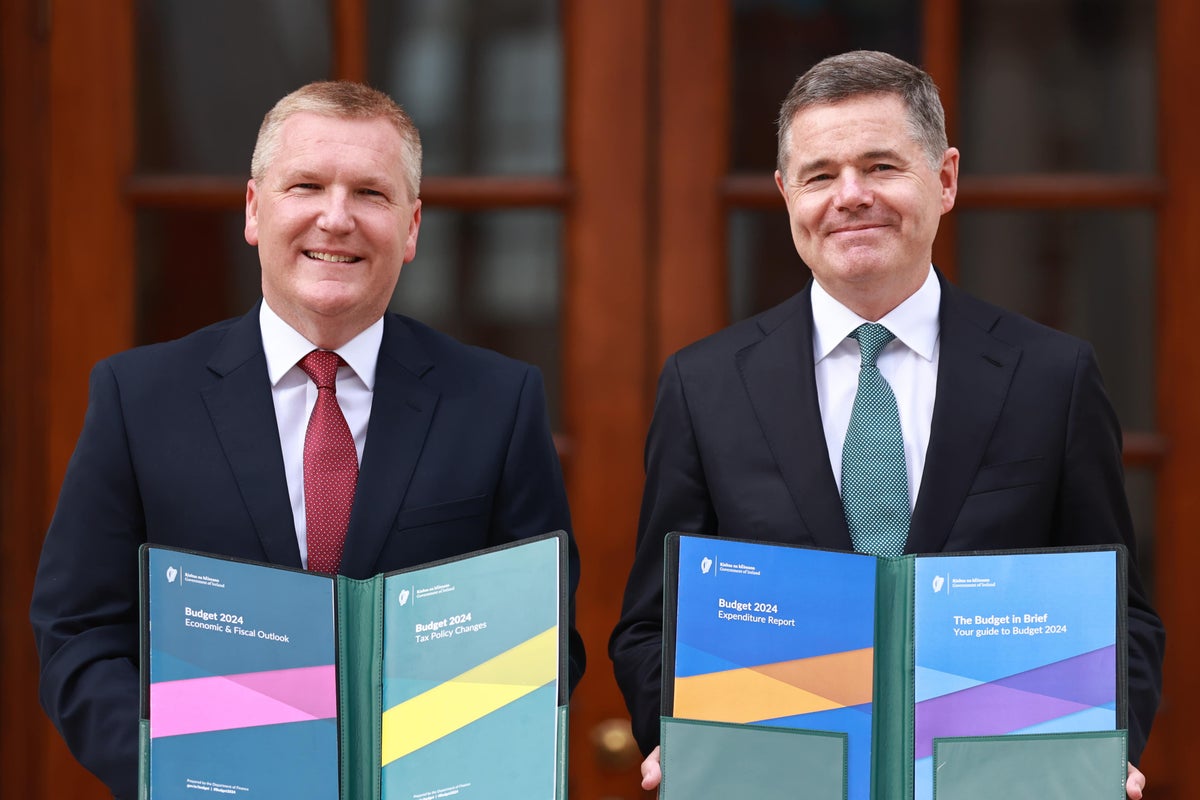
Irish Minister for Finance Michael McGrath has said the creation of major multi-billion euro long-term investment funds in Budget 2024 represents a “fundamental reform in how we plan the management of public finances”.
Mr McGrath announced two new funds that will use Ireland’s multi-billion euro windfall from corporation tax receipts, mostly derived from multinational companies, to invest in future priorities, including support for the response to climate change.
The Future Ireland Fund is designed to meet the costs of running the State in future as age-related spending is projected to surpass seven billion euro by the end of the decade.
A total of 0.8% of Ireland’s GDP will be invested into the fund every year between 2024 and 2035, for an expected total of 100 billion euro.
A separate Infrastructure, Climate and Nature Fund will grow by two billion euro for seven years.
It is designed to provide resources for capital investment in times of fiscal and economic stress.
Mr McGrath said: This government has taken action to manage the transition to a climate neutral and climate resilient society in the knowledge that it will have macroeconomic and fiscal implications.”
Overall, the Government insists the 14-billion-euro Budget package revealed on Tuesday balances current needs with the future wellbeing of the economy.
Mr McGrath said Budget 2024 was framed against a backdrop of “global uncertainty”.
The package agreed by the Fianna Fail, Fine Gael and Green Party coalition in Dublin includes a 5.27 billion euro increase in public spending.
The Budget also includes 4.76 billion euro of non-core funding to respond to exceptional circumstances, including the humanitarian response to the war in Ukraine; 1.16 billion euro on tax measures; a further 444 million euro in temporary tax measures; 1.4 billion euro for one-off cost-of-living supports; and 900 million on energy credits for households.
Mr McGrath said: “The annual Budget is about setting out how we can help with the needs of today, but it also has to be about planning for the next 10, 20, 30 years.”
This Budget continues that approach. Not spending every cent today; leaving some aside for tomorrow. Helping with the cost of living, but changing that help as inflation slows— Paschal Donohoe, Public Expenditure Minister
The Budget includes a one-year, tax relief on mortgage interest payments. The relief for those affected by soaring rates in the last 12 months will be capped at 1,250 euro per property.
The Government estimates that the measure will benefit 165,000 mortgage holders at a cost of 125 million euro.
Among the one-off, cost-of-living supports are three electricity credits worth 450 euro; a winter fuel allowance lump sum of 300 euro; a 200-euro winter living-alone allowance; a Christmas bonus for welfare recipients; and 250 million euro in one-off business supports.
There will be a 12-euro increase in the weekly social welfare rate for working age recipients and a 12 euro increase in weekly payments for pensioners.
In tax policy, the standard rate cut-off point for income tax has increased by 2,000 euro, meaning people will start paying the highest tax rate at 42,000 euro.
The rent tax credit has been increased to 750 euro.
Mr McGrath said a temporary tax relief to benefit small landlords would also be introduced.
This would see relief on rental income of 3,000 euro for 2024, 4,000 euro for 2025, and 5,000 euro for 2026 and 2027 at the standard rate – as long as landlords stay in the market for that full, four-year period. This could see landlords saving 600 euro in the first year, ultimately rising to 1,000 euro per year.
That measure has prompted opposition criticism that the Budget is favouring landlords over renters.
Elsewhere in housing, the Help-to-Buy scheme is being extended to the end of 2025.
In pay packets, the national minimum wage will increase by 1.40 euro per hour to 12.70 from January 1.
There is also a reduction in the middle rate of the Universal Social Charge (USC), a controversial tax introduced after the financial crisis, from 4.5% to 4%.
The Budget included a 0.1% increase in PRSI (Pay Related Social Insurance) contribution rates from October 1 next year.
The National Childcare Scheme will see a further 25% reduction in childcare costs from September next year.
The 9% reduced VAT rate for gas and electricity has been extended for another 12 months.
A revised bank levy is planned for 2024, with the aim of raising 200 million euro.
The Budget will see the temporary 1,000 euro reduction to the 3,000 euro student contribution to fees extended for a further year.
Students whose households have a joint income below 100,000 euro can apply for a grant through Susi (Student Universal Support Ireland) to secure a further 500 euro fee reduction.
Mr McGrath also deferred a planned fuel excise increase which was due to happen on October 31. This will be somewhat tempered by an already-agreed rise in carbon tax rates set to impact motorists at the pumps.
There was a 75-cent increase in excise duty and VAT on a pack of 20 cigarettes.
We needed a Budget for renters, instead we got a Budget for landlords— Pearse Doherty, Sinn Fein
In further expenditure measures, the Government announced funding to recruit 1,000 more gardai into the Irish policing service and 250 civilian staff.
A scheme which provides for free school books has been extended into the first three years of secondary school.
Child benefit will be extended for 18-year-olds who are still in full-time, secondary education.
There will be one billion euro provided for the development and renewal of the Irish road network, and “one million euro per day” invested in cycling and walking infrastructure.
The 4.76 billion euro for “exceptional challenges” includes 2.5 billion euro for measures like the education, welfare payments and accommodation for Ukrainian refugees; 1.3 billion euro for the ongoing Covid-19 response in Ireland; and 700 million euro for other responsive provisions under by the National Recovery and Resilience Plan.
Public Expenditure Minister Paschal Donohoe said recent budgets had been defined by global challenges, including climate change and the threat of violence around the world.
He said those challenges could have caused “long-lasting harm” to the Irish economy.
He said the reason they had not was because Ireland’s public finances had gradually been returned to health, from deficit to balance to surplus.
“This budget continues that approach,” he said. “Not spending every cent today; leaving some aside for tomorrow. Helping with the cost of living, but changing that help as inflation slows.”
He said the Government was spending more on public services and building more homes, more schools and better public transport.
But he said that was not based on spending money “we may not always have”, referencing the windfall corporation tax receipts.
“This is why this Budget well help with the cost of living, will help with better public services and will give more children a better start to life,” he said.
Minister Donohoe said an increase in core funding for health “needs to be fully realised with a focus on productivity, better financial governance and consolidating funded capacity”, following criticism over a projected one billion euro overrun in the department for 2023.
No urgency, no vision, no compassion... You’ve just decided to forget about health— Pearse Doherty
Opposition politicians immediately criticised the Government’s planning around housing, healthcare and tax policy.
Sinn Fein finance spokesman Pearse Doherty said the Budget was a “squandered opportunity” to deal with inequality.
Mr Doherty said the housing crisis should have been the number one priority in the Budget.
He said: “We needed a Budget for renters, instead we got a Budget for landlords.”
The opposition TD said the Budget had done “next to nothing” for the health service.
“No urgency, no vision, no compassion, and that’s the reality. You’ve just decided to forget about health.”
Labour TD Ged Nash described Budget 2024 as a “lazy rerun of all that was wrong with Budget 2023”.
“Tax cuts that favour the better-off again. Failure to properly fund the public services on which we all rely, and which the citizens of this rich Republic should expect,” he said.
“Again, a wall of once-off payments, but no permanent change and once those once-off payments are gone, they’re gone.
“The budget that will yet again be found to be regressive once lump sum payments melt away like snow on a ditch.”
Social Democrats finance spokeswoman Roisin Shortall said the Government’s housing policy is a “litany of failure”.
“There was an opportunity with this budget, given the resources, to do some transformative things to tackle the big problems facing the country and ensure that we are not again pulling up the ladder and passing on problems to the next generation to solve.
“But instead we have a budget that is desperately short of ambition.”







